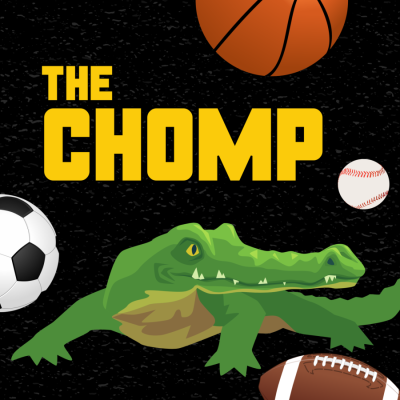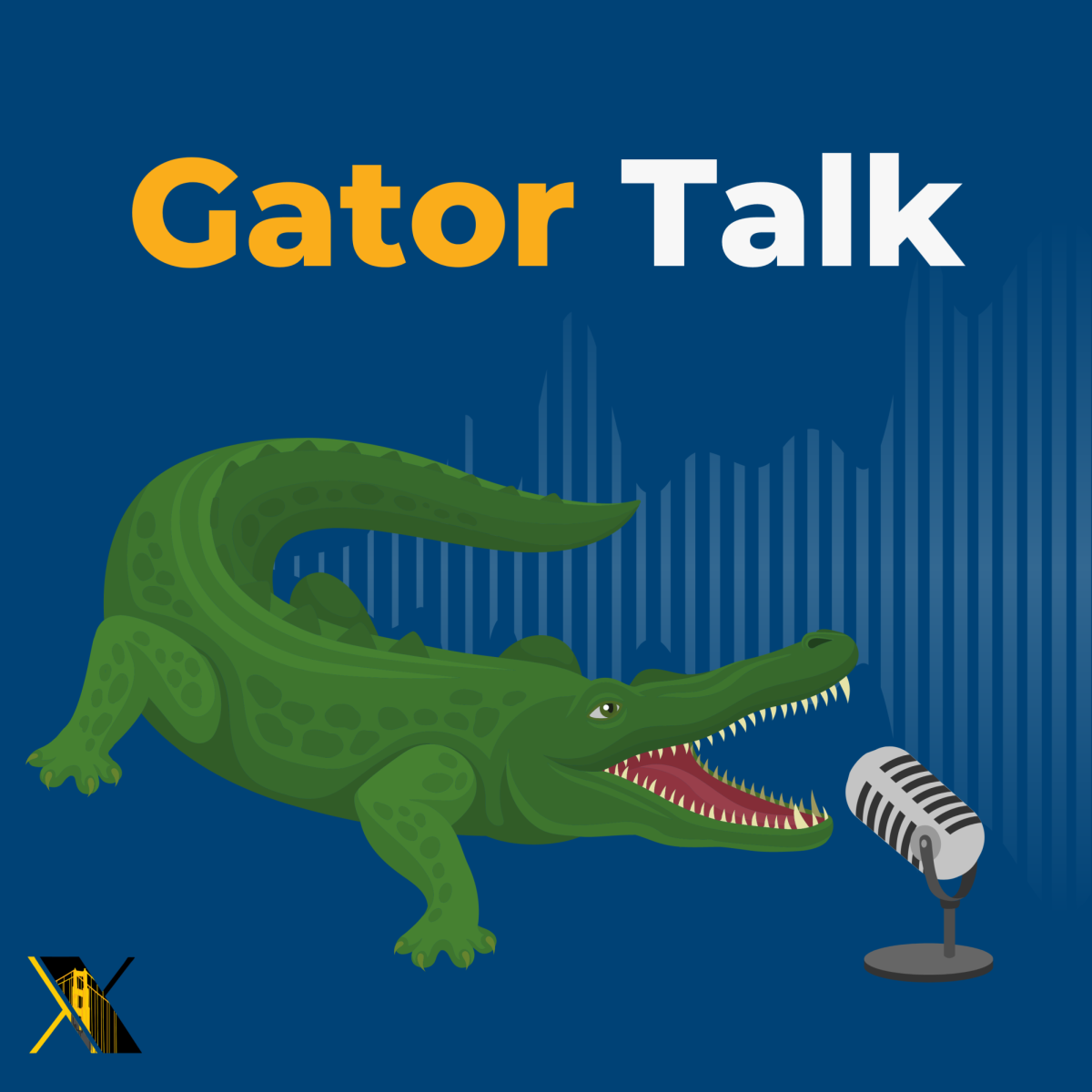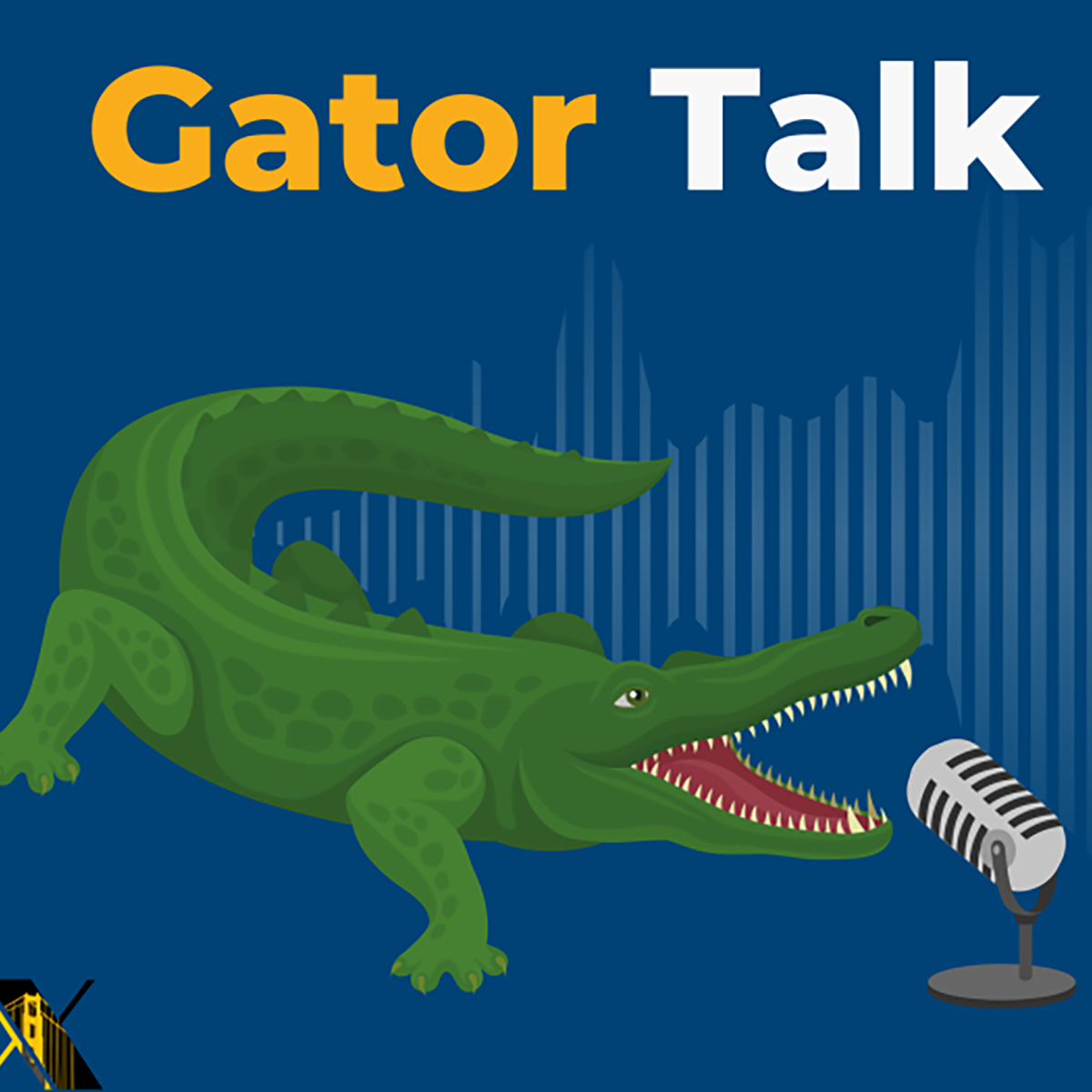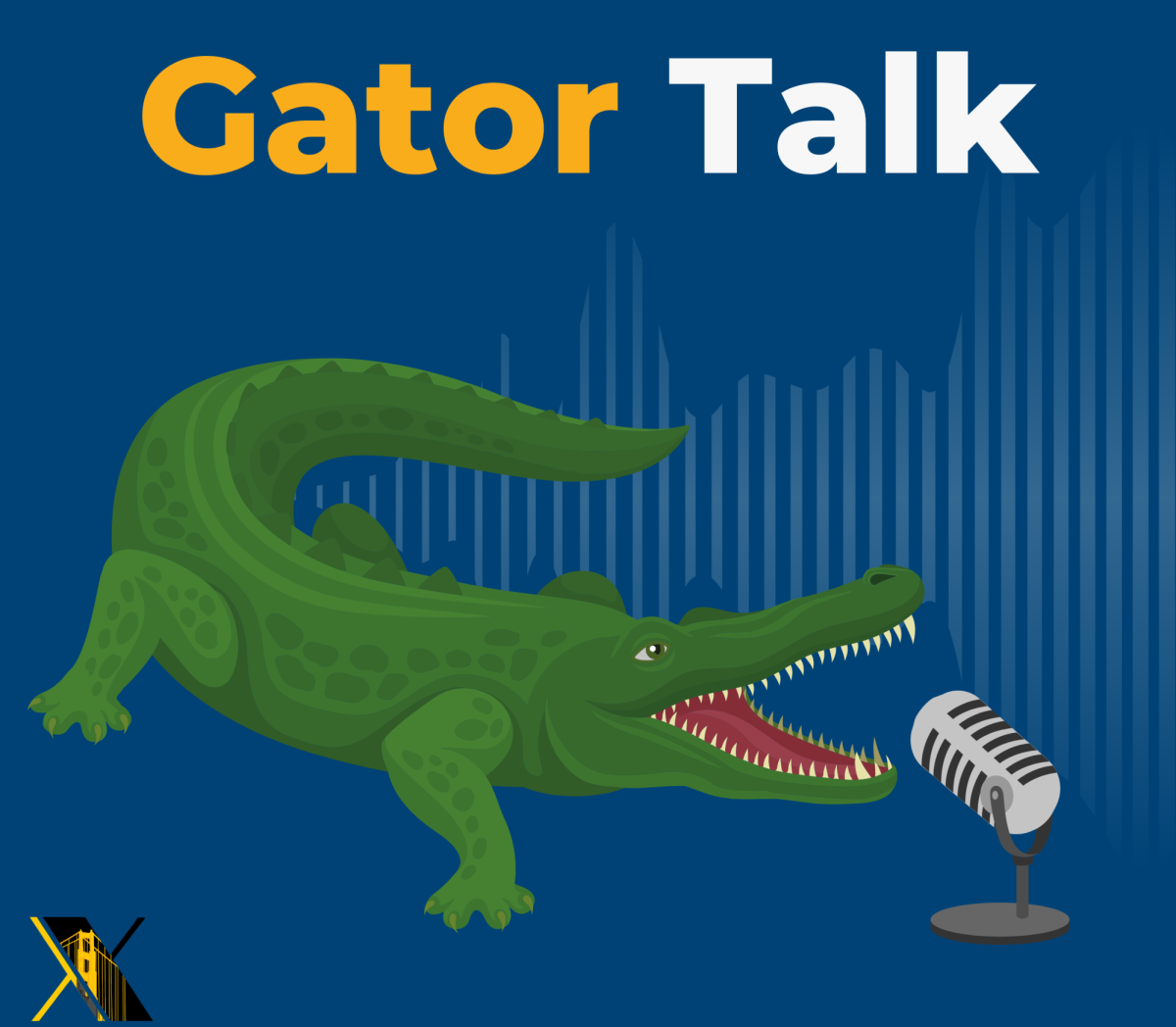Intro
Jonah:
Welcome to the Chomp Pod. My name is Jonah Chambliss. I’m a staff reporter here at GGX. This week, we have Mark Sigmon on. He’s the History of Baseball professor here at SFSU. He’s also a huge Oakland Athletics fan. So, we just talked baseball with him and talked the A’s move in the broader history of Major League Baseball.
Interview
Jonah:
So I’m here with Mark Sigmon, SFSU professor, he teaches a History of Baseball class, here on campus. And I think I just wanted to sort of get an idea of what your class is like and talk to you about the A’s. We talked a bunch just off camera, about the A’s and the A’s move. And I sort of just wanted to do a little conversation about it from a historical perspective as well, right? So I guess intro, where are you from? Where did you go to school? You’re a huge A’s fan. How did you become an A’s fan?
Mark:
Okay. How should I put this — when I was really young, my dad was in the Navy. And we ended up going to Oslo, Norway, serving with NATO. And I was on a little league team, they tried to make it as close to America as possible. And I had a chance to write away — to write a letter to a baseball player. I don’t know if you’ve ever heard of a guy by the name of Carl Yastrzemski. And he would send back free batting tips and stuff. So as a little kid, I wrote away to him, and he wrote back and then I became like a hardcore Red Sox fan. And then my dad got transferred to Alameda, which is right next to Oakland. I was still a hardcore Red Sox fan all during the great championship years of the Oakland A’s in the early ‘70s. But then, when I was a freshman in college, it was Ricky Henderson’s rookie year, it was Billy Ball. And I decided, “You know what, the Sox are never winning. And if I’m ever going to switch allegiance, now’s the time.” I switched over to the A’s and I’ve been an A’s fan ever since. And right up until the last year or so I would say it was one of my better baseball decisions. But yeah, so that’s how I became an A’s fan.
Jonah:
I think it is worth going back and saying you were pen pals with Carl Yastrzemski.
Mark: Well, sort of.
Jonah:
Carl Yastrzemski is a Hall of Fame Boston Red Sox first baseman.
Mark:
Well he played first base, also left field for the Red Sox. I wouldn’t say I was a pen pal., I was just like, there was an ad in Boy’s Life [magazine]. I answered the ad. I got something back. You know, I was thinking, it was like little things like that. It was free, right? And it just made me into like a lifetime fan.
Jonah:
It connected you to the game. We don’t do that anymore, do we?
Mark:
We don’t have anything like that where some little kid could write to some baseball player and (talk), I guess with social media and stuff.
Jonah:
Yeah, you can sort of connect with them a little bit.
Sean, who’s one of our reporters here at GGX staff, told me to ask you about Ray Fosse. You are huge, fan right. Ray Fosse who was a catcher for the A’s. He was a beloved play-by-play announcer who passed away recently. But Ray Fosse, every A’s fan loves Ray Fosse. Is there a memory or reason for Ray Fosse in particular?
Mark:
Well, again, I was a Red Sox fan. Fosse was a member of the World Championship A’s teams, but in my class, History of Baseball, we talk a lot about who belongs in the Hall of Fame and who doesn’t belong in the Hall of Fame. And when we get to Pete Rose, and should Pete Rose be in the Hall of Fame? And I’m like, “Oh hell, no, he should not be in the Hall of Fame.” One, because baseball has one rule that’s in every single clubhouse, which is don’t bet on the game. And two, because he ran over Ray Fosse in that all-star game and broke his collarbone. And he was never quite the same really.
Jonah:
Yeah, his career kind of ended because of that. That’s a very famous Pete Rose hustle club where you’re just like what the heck.
Mark:
And it was an exhibition game. And he didn’t even have to, you know? He had a clear path to the plate.
Jonah:
You touched on the History of Baseball class. What is that class like? And I think in the question I had, is it as fun to teach as I would expect to be? I mean, how did you come up with that class and get that approved? That’s like a kid’s dream.
Mark:
Yeah, yeah. Well, let me just give you a little bit of academic background. So I grew up in Alameda. And I went to UC Berkeley for my undergraduate. And then I got a degree in history from Berkeley. I wasn’t sure what I was going to do. So I applied for graduate school. And I got into graduate school and I ended up writing a Ph.D at Berkeley. And then I graduated — it took me a while — I graduated in 1995. I got hired here at SF State. I was teaching here and I’ve done well, kind of popular with the students and likable. Then, there was already a class on the history of baseball, Jules Tygiel who wrote a book on Jackie Robinson. He and an English professor, Eric Solomon, started the class. I think, in the early 2000s, maybe late ‘90s. Yeah, but Jules sadly passed away of, I think it was pancreatic cancer. And so the class was dormant for about four or five years. And then in — I think it was 2013. I asked my department chair, Hey, what would you think if I took it? And she thought about it for, I don’t know, 20 or 30 seconds? And she said, “Yeah, sure. Go ahead.” And so I’ve been teaching it ever since 2013.
Jonah:
And what do you learn in that class? I mean, is it simply the history of baseball? Do you go back and sort of talk about who was the MVP in 1980? Or is it notable historical things within baseball’s history?
Mark:
I think it’s really interesting. Once you start teaching the class, you start seeing different trends and how different trends come together. For example, I go back to like the origins of the game. And one of my favorite stories that I teach about is, there was this team in Philadelphia, the Philadelphia Pythians. They were an all-Black team. And in 1869, they applied to join this sort of new baseball league that was developing. There’s like this fraternity of baseball players. And there was something like 200 teams that applied. And they were gentlemen, and most baseball players at the time were like gentleman, but they were Black. They had gone to this incredible finishing school. And the powers that be, the people running the league are like, “Well, if we let in a Black team, it might offend some people. But if we kick them out, and don’t let them come, well, it won’t really matter.” And, and I see that sort of genteel racism in the early game of baseball. But the other thing is, one of their star players — and the captain of the team, was a guy by the name of Octavius Catto. And he was a great baseball player, but he was also a social activist. And, he was actually shot to death, trying to vote in Philadelphia in 1872. And so, because I’ve studied US history and have taught US history, I see these trends throughout US history. And then you see how baseball reflects a lot of those trends. And so, like, there’s that sort of violent racism, along with the genteel racism in the 1860s, in the 1870s. And, you know, baseball illustrates that.
Jonah:
Yeah baseball, sort of reflecting back the cultural — of what was happening at the time. That’s interesting. I brought you here to talk about the A’s, we’re both as fans. That’s how we met, I came to your office and talked about the A’s with you, right? First, as a fan, how do you feel about everything that’s happening recently? There’s so much going on, but in general, sort of the move to Las Vegas. Now, we know it’s to Sacramento for a few years before it moves on to Vegas. Just how as a fan, how do you see that move? How does that make you feel? What’s your reaction to the move?
Mark:
It’s really hard. Don’t get mad at me. I don’t watch the A’s anymore for the first time since, I think, 1978. Last year was the first time since 1978. That I wasn’t following every A’s game. At first it was on the radio, then it was on cable television. So I had a whole bunch more time last summer. And this summer as well. And I kind of hope that the A’s lose every single game as long as Fisher is the owner. And I’m part of the boycott, I’m not going to go to a single game. I’m not going to give him another one of my dollars. And my brother, who’s up in Washington, was like, well you know, it’s not the players’ fault. You can still cheer for the players, but nah. I don’t want to give Fisher anything.
Jonah:
Yeah, that is sort of the I can’t think of the word, but the situation we’re all stuck in fandom while also not wanting to actually monetarily support that situation. I guess what do you think of John Fisher? That was a question on my list just — We talked about it. I said to you, before we were recording, it’s just “Major League” incarnated in real life, the “Major League” movie, trying to lose, to sell the team. What do you think of that situation? What do you think of this owner, who’s really just putting fans down?
Mark:
I tend to — well, there’s a lot of different ways to look at it. I tend to blame the rest of Major League Baseball. They could have stopped this a long time ago. The very fact that Fisher is even talking about moving to Las Vegas, is because in the collective bargaining agreement that baseball signed with the players, the last go around, they said he had to have a stadium in the works, funding for a stadium in the works by January of 2024. And they were so close at Howard Terminal, at least it was the impression we got. You know, the thing that ticks me off the most about that is the Coliseum is a great site for a baseball stadium. It’s right next to BART, you can just walk across the bridge. But he said he wanted this sort of out of the way place to develop this major real estate thing. And then all of us said, ‘Well, he owns a team. And if he’s going to keep the team here, we should support this Howard Terminal, even though the Coliseum, it’s a much, much better location.” And then he sort of stringing us along and stringing us along. And then at the last minute, he kind of pulls the plug on the whole deal, and then says, “Oh, we’re going to Las Vegas.” It’s like, after we bent over backwards for you. And we did everything and we supported all these terrible player personnel moves when you let Marcus Simeon walk away. And then when you traded, Matt Olson and everything other than the catcher to —
Jonah:
Murphy, Sean Murphy. Everybody’s on the Braves now. Everybody’s on the braves.
Mark:
And what did we get back in return? We got prospects who will probably never make it to league.
Jonah:
They won’t play in Oakland. They won’t play in Oakland.
Mark:
And this stupid promise of “Oh, well, when we get our stadium built, then we’ll really invest in the team.” I am sorry. You know, what’s interesting is Dave Kaval was on Twitter. And when he became sort of like, team president, or whatever his role is, and I was actually texting back and forth with him. And he was talking about how he wanted to come to our class, and talk to SF State students about the A’s. And he had this open window where you could come talk to him and stuff. And now it turns out that he’s just a two-faced liar.
Jonah:
They went back on that now. The first time we spoke, you talked about baseball in this interesting way, where you represented it like as a river, and it has like all these splits in the stream, or however you really want to say it. But I just thought that was such an interesting metaphor you brought up last time and how baseball has a way of sort of naturally correcting itself. Is there a correction to keep baseball in Oakland? Where do you see baseball and Oakland going? Why is baseball in Oakland even important? Personally, I know why I think baseball in Oakland is important. But what would you say, sort of where do you see baseball going?
Mark:
It’s interesting you know, you asked what the best thing about teaching the history of baseball is, you get to read a lot of books, and you’re getting paid to study the history of baseball, that’s kind of fun. But as I’ve studied the game and as I see changes in the game, I get the sense that baseball is like this mighty river that is moving more and more towards perfection. And every now and then people screw it up. And, for example, not allowing Black players, you know, this is Jackie Robinson’s day, not allowing Black players to play — that was like an impediment that was like an obstacle in the river, and the river built up behind it. And there’s this enormous pool of African American talent. And then finally, you know, Branch Rickey and Jackie Robinson, they, they broke through, and then the river is flowing and, and you see that with the international game, and more and more people, it’s like baseball is moving closer and closer to perfection. And then you get some clown, like John Fisher, who is not interested in the best interests in baseball, not interested in what’s best for the game, he’s just interested in making as much money as he can. I am hoping that the mighty river of baseball is going to sweep him away, and other owners that have that attitude. I am really worried about — there are certain owners that are trying to get as much as they can from their communities, trying to rip off communities. And it’s really kind of disappointing. But I think he’s not good for baseball, he doesn’t belong in baseball, and I think he will be out of baseball. I think he’s going to have to sell the team. I really don’t think this deal in Vegas is going to work. You know, baseball could expand to Vegas, I could see that. But you talk to the people who are starting to get the message that John Fisher’s just this big cheapskate that’s going to bring this losing team and never gonna have any players.
Jonah:
A lack of investment in his franchise. Why would they want a team with an owner who doesn’t really care?
Mark:
So I think they’re having some doubts. And I really think that this whole stadium deal, they’re gonna put it on the ballot and it might fall through. And when it does fall through, I think at that point, Fisher will probably try to sell the team. I saw a really interesting —I think it was on TikTok, I’m not sure —but they were talking about how baseball in Oakland can be successful if you invest in the team. I mean, when the Haas family took over the A’s, and they brought in Rickey Henderson, and they brought in Billy Martin, and you had this new kind of baseball. And then when they developed the team until you get to Jose, Jose Canseco, and Mark McGwire and the shortstop, I’m blanking on his name. Anyway, three rookies of the year right in a row. And you had Dave Parker, and you know what the place was packed? Yeah. And the Giants were talking about moving to Tampa Bay or something.
Jonah:
And even in recent times, the most recent wild card game, I was at that game, and they had to open the third deck for everybody, because tickets sold out. So even recently, we’ve seen people in Oakland will show up to games if the team is competitive right?
Mark:
Yes, it’s Oakland. But also the other thing is that every owner in baseball, I think, would love to have sellouts every night, and put an incredibly low-salary team on the field. But it doesn’t work that way. If you’re winning, people will come. I mean, I hate to say it, I mean, no matter how nice the park is, you have to win. If you’re investing in the team, growing the team, and you’re winning, then the fans pack the stadium. And if you trade away all your best talent, trade away before they’re even arbitration eligible, then the fans finally say enough is enough. And you get to the point where opening night, they drew 5000 people or something.
Jonah:
And the more people I talked to as I’ve done interviews with a lot of people over the last month or two about the A’s and their fandom about it. Most people sort of are falling on the “I’m not going to be a fan anymore” type of route, which is sad. That’s just the MLB losing viewership and ans losing something they cared about, which is sort of the main point for me as a fan and a journalist, I cover it, but as a fan is just a bummer. Oakland baseball is this really nostalgic thing for me from growing up, and it’s a bummer to not have it, it’s just gonna be missed. I think Oakland fans will be missed from the league too.
Mark:
Yeah, you can see. I don’t know if you went to the FanFest, but I went to like the FanFest that the fans themselves put on. And the spirit there and the camaraderie and I mean, Oakland’s always had these amazing fans, especially out in the bleachers. It can be incredible. It can be incredible. And it will be incredible again. I don’t know if it’ll be with the A’s or if it’ll be with an expansion team or something. But at some point, Fisher’s going to sell that team. And I hope he sells it to a local, because the mayor of Oakland has people lined up.
Jonah:
I told you I did an interview with Casey Pratt. He told me that there’s multiple buyers who are interested, but they can’t say it, because MLB ownership is sort of this close-knit group right. Like a boy’s club. But there are people there, billionaires who want to buy the team, keep it in Oakland, it’s simple as that. It’s just that Fisher doesn’t want to sell it.
Mark:
Fisher doesn’t want to yet. I have a funny feeling that he’s trying to jack up the price and trying to get as much, it’s already 10 times what he paid for it.
Jonah
And the Bay Area is a huge market. That’s a part I hate. It’s like there’s not this huge media market, like we have where you have —
Mark.
To draw an analogy to a different sport. It kind of reminds me of the Super Bowl a little bit. And that if you remember the last drive that the Chiefs were on, right, the Niners just needed one stop. If they could just get one stop, they would win the game. And they had many opportunities. And that’s sort of how I feel about the A’s. We just need one stop. It could have been that the other owners said no, we’re not going to waive the relocation fee, $500 million. We’re not going to let that slide. And then it would have been stopped when Vegas could have said “No, we’re not going to fund this stadium.” Or it could have been where you’re going to play for the next three years. You either got to play at the Coliseum and make these concessions and then Sacramento steps up. Or it could have been the television contract. They could have said we’re not paying you $70 million to play in a minor league park. And again, minor league park is — it’s not Major League Baseball, the river is going to wash that away. I’m sorry. That’s my hopefully faith in the mysticism of the game.
Jonah:
I love that analogy. You said that analogy to me the first time we met and I was like, “I’m gonna get this guy podcast. He can talk.” Yeah. Well, Mark, thank you for sitting down. I know you wanted to. We gotta get you out here before four o’clock. And I just appreciate it because this is really fun. These are the stories. These are fun. So yeah, I really appreciate it. Thank you so much.
Mark:
My pleasure.
Outro
Jonah:
Right, thank you for listening to the Chomp Pod. We’ll be back with more episodes in the upcoming weeks.









